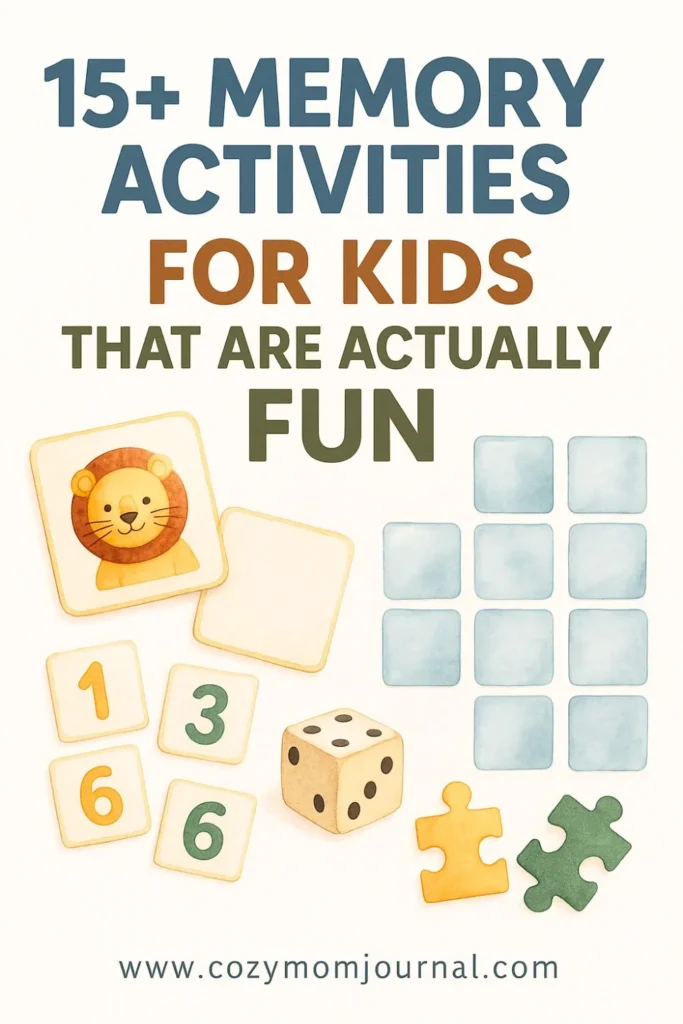Ever feel like your child has the memory of a goldfish—until they suddenly recall every single time you said no to dessert?
If you’ve been there, you’re not alone. The good news? There are so many memory activities for kids that not only boost brainpower but also count as actual fun. No worksheets or screen time required.
Whether you’re a parent battling boredom on a rainy day, a teacher trying to keep attention spans intact, or a grandparent craving quality time, these creative games bring out the giggles and the growth.

Why Memory Games Matter for Kids
Memory is more than just remembering where they left their socks (although that would be helpful). It’s a building block of cognitive development, helping kids grow stronger in attention, problem-solving, and even emotional regulation.
Introducing memory activities for kids early on encourages better focus, improves classroom learning, and enhances creativity. Even better? It doesn’t need to feel like school. Just play.
With the right mix of educational games and playful tasks, memory skills can be built into daily life—often without kids even realizing they’re learning.
1. Matching Card Games That Never Get Old
Let’s start with a classic: matching cards. You can use a store-bought version or simply draw shapes, animals, or numbers on small pieces of paper.
Turn the cards upside down and take turns flipping two at a time, trying to find a match. Kids love it—and they don’t even realize how much they’re strengthening memory, logic, and visual recognition.
It’s one of those fun games for kids that doubles as a quiet-time activity or a go-to for rainy days.
2. The Tray Game: What’s Missing?
Here’s an easy win: place 8–10 random objects on a tray. Give your child a moment to observe them, then cover the tray and secretly remove one item.
Uncover it and ask, “What’s missing?” You’d be surprised how quickly even toddlers pick up on the challenge.
This activity supports concentration and short-term memory—two skills that are vital during early preschool learning.
3. Build a Story Chain
One of our favorite brain games around the dinner table: story chains.
One person begins with a sentence like, “Once upon a time, there was a frog who loved pizza.” The next person repeats that sentence and adds their own. As the story builds, so does the memory test.
Bonus: you’ll all end up laughing at the bizarre plots your family creates.
4. Indoor Games for Memory and Movement
When you’re stuck inside, indoor games that boost memory are your best friend.
Try a memory scavenger hunt: hide a few toys around the living room and give your child clues they need to remember as they search. Or play the toy line-up game—arrange toys in a specific order, let your child study them, then mix them up and ask for the original order.
Simple? Yes. Powerful? Absolutely.
These kinds of memory activities for kids are fantastic alternatives to screen time, encouraging screen-free fun with built-in learning.
5. Simon Says… With a Twist
We all know “Simon Says,” but add a memory challenge: string three or four actions together and ask your child to repeat them in order.
For example: “Simon says hop twice, spin around, and clap three times.” Suddenly it’s not just a game—it’s a mental workout wrapped in silliness.
And best of all, it turns classic kids games into engaging memory builders.
6. Toddler-Friendly Memory Activities
Even toddlers can benefit from gentle memory play.
Try showing a sequence of colored shapes, then asking them to repeat what they saw. Use familiar objects from their toy bin or even snacks for more engagement.
Another great idea: play “Name That Face” using family photos. Hold up a picture and let them name the person. It builds emotional memory and supports toddler activities that are rooted in connection and routine.
7. Memory Activities for Preschoolers
Preschool is the perfect time to sneak learning into play. Try these:
- Create picture sequence cards (like brushing teeth, getting dressed)
- Use matching games with letters or animals
- Act out short routines and have kids copy the steps
These preschool learning activities help children retain sequences, listen actively, and develop working memory—key for kindergarten readiness.
8. Family Game Night Favorites
Looking to combine bonding with brain-building? Add memory-based games to your family game night.
Play the classic “Memory” board game, where kids flip and match cards. Or try printable memory games you can find online—many are themed with animals, colors, or seasons.
Another fun one? DIY memory bingo. Give clues and have kids mark the right square. It’s a great way to teach listening, recall, and focus.
Plus, everyone can play—from preschoolers to grandparents.
9. On-the-Go Memory Boosters
Some of the best memory activities for kids don’t require any setup at all.
Try these in the car or waiting room:
- “I went to the store and bought…” (add and repeat items in order)
- Hand clap patterns (you clap a rhythm, they copy it)
- Action copycat (you do a few silly moves, they repeat in order)
They build cognitive development and patience, disguised as entertainment.
10. Make Memory Play Stick
Want to make sure these games actually work? Here are a few tips:
- Keep the activities short and upbeat—especially for younger kids
- Tie games to your child’s interests (trucks, unicorns, dinosaurs?)
- Celebrate effort, not perfection
- Incorporate memory play into daily life—like remembering errands or snack ingredients
Above all, treat these games as what they are: joyful learning moments.
What If It Feels “Too Simple”?
Some people worry these games aren’t “academic” enough. They might say, “Shouldn’t we be doing flashcards or apps?”
Honestly? Not always.
A Quick Story from My Living Room
One rainy afternoon, I was desperate. No screens, no plans, and two restless kids staring at me like I was their personal cruise director.
So I lined up 10 random items from the kitchen drawer—rubber band, spoon, measuring cup, a googly eye (don’t ask).
I gave them 30 seconds to study the tray.
Then I removed one.
When I asked “What’s missing?” I expected maybe one right guess. Instead, my 4-year-old nailed it. Then insisted we play again—with her picking the items.
She played for an hour—and then taught her stuffed animals how to do it.
Not bad for a rainy afternoon with zero prep.
Want More Ideas Like This?
If you’re into low-pressure parenting wins and playful learning, don’t miss these other helpful reads from the blog:
👉 The Ultimate Summer Bucket List with Kids
👉 10 Smart Parenting Habits That Make Kids Feel Safe
And for fresh inspiration and seasonal printables, make sure to follow me here:
🧠 https://www.pinterest.com/cozymomjournal/
Final Thoughts: Play Is Powerful
These memory activities for kids don’t just pass time—they build brains, spark laughter, and deepen bonds. The more we play, the more they learn.
And as a bonus? You get to be the fun parent or teacher who sneaks in learning without a worksheet in sight.
So… which game will you try first today? I’d love to hear how it goes!


